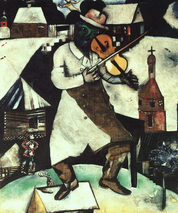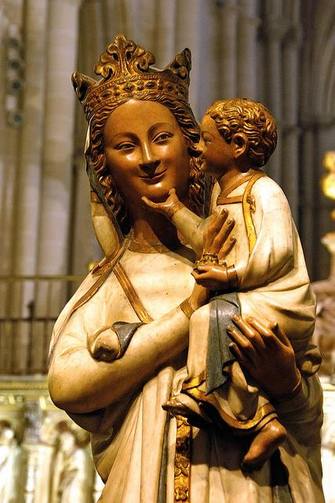|
“With a happy and cheerful face, we can prove that the imitation of Christ fills our lives with joy.”
– St. Vincent Pallotti We live in a celebratory society. We celebrate the birth of a child, the graduation of a student, and the birthday of a friend. In my family, there is always an excuse for a party. This past year, in particular, offered many opportunities for celebrations: the birth of my niece, my Grandma’s 85th birthday, my sister-in-law’s new job, the wedding of two different cousins this past fall, and my own wedding last summer. As a society and in our families, we have parties for holidays, sporting events, and sometimes for no particular reason at all. Why not take those every day celebrations and lead them into a celebration of the life of our faith? Why not live our faith life with joy? Our Catholic faith is one of celebration; we are an Easter people, a joyful people! In his letter to the Philippians, Paul tells the disciples: “Rejoice in the Lord always; again, I will say, rejoice.” (Philippians 4:4). We are urged in our faith to rejoice and celebrate all we have been given from God. In his book Between Heaven and Mirth: Why Joy, Humor and Laughter Are at the Heart of the Spiritual Life, Rev. James Martin, SJ tells a story of meeting the Superior-General of the Jesuits, Peter-Hans Kolvenbach, during his formation. When Martin asks Kolvenbach what the best ways are to increase vocations, the Superior-General replies, “Live your own vocation joyfully.” Martin goes on to say, “Joy attracts people to God. Why would anyone want to join a group of miserable people?” (88). If we are living out our faith joyfully, others will take notice. We can even look to the saints as examples of how to live our lives joyfully. St. Therese of Lisieux lived her vocation joyfully as a Carmelite nun, doing little acts for those around her; living out her faith in a simple way. St. Francis of Assisi felt that his life was a gift of love and spent his life in thanksgiving for that gift. No matter what our vocation in life is and no matter what we are facing, we need to remember we are an Easter people and strive to live life with joy. This doesn’t mean that we have to be happy all the time or that there won’t be periods of darkness or indifference. It means that we need to cherish what we have been given, aim to serve others, and celebrate our faith in God. “Rejoice in the Lord always; again, I will say, rejoice.” Monica Thom Konschnik serves as the Administrator for the Catholic Apostolate Center and the Pallottine Seminary at Green Hill.
0 Comments
January 29th- that means sixteen days until Ash Wednesday, twenty days until the first Sunday of Lent, thirty-four days until Easter Sunday, and it doesn’t end there…. Although it has only been a few weeks from the end of the Christmas season, already my mind jumps to all the feasts and celebrations that we quickly find ourselves in. This might be due to the quick race into the Lenten season this year, but I think that it has more to do with my need to plan. I confess that I am a chronic planner. My room is covered in post it notes, I have multiple color-coded calendars for the different aspects of my life, and I find nothing more satisfying than crossing something off a to-do list. Although this is the reason that I am able to balance everything in my life, it is also the reason I tend to dread stillness and quiet. I can’t plan out stillness, I can’t know when it is going to end, and it usually doesn’t end in me being able to cross something off a list. Yet, it seems as though within silence I am overwhelmed by the presence of God that is made manifest in the solitude.
Although I tried to address the problem on my own, when I brought it up to a good friend of mine he stared at me for a moment then stated simply, “So you have finally decided to start listening to some of our saints?” His wise remark rung true in my heart. I avoid the silence, I avoid the solitude, I avoid listening to the wisdom of those who have gone before me. Many lips and pens of our Catholic spiritual masters speak and write about this realization of silence. St. Francis de Sales writes, “Never be in a hurry, do everything quietly and in a calm spirit. Do not lose your inner peace for anything whatsoever, even if your whole world seems upset.” Mother Teresa says “we need silence to be alone with God, to speak to him, to listen to him, to ponder his words deep in our hearts. We need to be alone with God in silence to be renewed and transformed. Silence gives us a new outlook on life. In it we are filled with the energy of God himself that makes us do all things with joy.” St Theresa of Lisieux states that if you “settle yourself in solitude…you will come upon Him in yourself.” While the cold wind howls and the silent darkness comes upon us mid-afternoon, let us take these last few weeks of winter to enter into the stillness. Let us know the wisdom of St. Francis de Sales and not be in a hurry for spring. Let us echo in our hearts the words from Mother Teresa reminding us that in silence we are renewed and transformed through the energy of God. And let us find in silence God residing within ourselves. In the words of the psalmist, “Be still and know that I am God (Ps 46:10)” Pam Tremblay is the Blog Editor for the Catholic Apostolate Center.  I’m convinced that God has added to the hosts of angels a new rank: Facebook-aphim. Facebook seems to be the messenger of all things surprising in our time. From births to shocking engagement announcements, I learn most things I know through Facebook. A few days ago, I learned that a wonderful woman who I once worked with died after a very long battle with cancer. She was the receptionist in the front office of the Catholic high school where I was employed after I graduated from college. She was usually the first person who greeted me when I entered the building each morning. Her chipper, “Good morning, David!” was as unrepeatable as she. To say that she was a character and full of life would be an understatement. I look forward to her greeting the next time we meet face-to-face. While the school in which she and I worked was founded to educate young people, I often found that I was the one being educated. The school was run by the Oblates of St Francis de Sales, and it was there that I met Francis de Sales in the men and women who live his charism of incarnational love, gentleness, and authenticity. They invited me into their lives of faith, which, at that point, fit none of the conventional rules of faith I was used to. In fact, the things they taught me about the Christian life didn’t have any rules to play by at all. They taught me about what a very human life of faith was all about. They invited me on their journey of life, a very Salesian thing to do. My former coworkers, and those who follow Francis’ way of life, embrace the humanity of our existence (read: the messiness, uncertainty, and hurt) that God came to redeem. They live authentic lives, in all their brokenness, because they live with an awareness of God in the present moment. My coworkers were aware of God’s presence as they dealt with the death of their spouses or parents or our coworkers, students, and friends. They were aware of God’s presence during their divorces or terminal illnesses or their children’s poor decision making, failure in school or struggles with drugs. They were aware of God’s presence when they celebrated their children’s weddings, the birth of their grandchildren, and when that student who had struggled for four years graduated. And when I came to them in my times of need, unsure of God’s presence in my life, they somehow knew enough to speak to me in love, and they made themselves understandable because hearts speak to hearts, lips speak only to ears. It was then that I understood what God’s listening might be like. In sharing their lives with me, both the successes and failures, they illustrated that the call to discipleship is the call to be who you are and be that perfectly well. For us, we were teachers and staff and administrators, but we were also mothers and fathers, sons and daughters, friends and mentors. Francis reminded us that our vocation was only to be the best of what and where we found ourselves. To be the best child or the best educator was our call. They showed me that the best way to live the Christian life was not necessarily as a monk or religious, but as a person who lived the life that God called him to in the present moment, as well and with as much love as he could. To be who you are and be that perfectly well is much harder than it seems, but attempted in full humility brings the liberation that we enjoy as beloved children of God. How often do we claim that authentic identity and make it our own? I am forever grateful for having learned of Francis de Sales and his charism of Gospel living. I am indebted to the men and women, those who I now count as friends and those who I wait to see again in eternal life, who showed me how to Live Jesus. I am confident that the friendships taken up in this world will be taken up again, never to be broken off. In the Christian life, we are together on a journey to heaven. But it takes a lifetime of patience, generosity, and authenticity with and for each other to get it right. David Pennington is the Associate Campus Minister for Liturgy and Worship at The Catholic University of America.
Jubilee Message from His Eminence Tarcisio Cardinal Bertone on behalf of His Holiness Pope Benedict XVI
At the conclusion of the celebrations (of the aforesaid Religious Community) marking the 50th anniversary of the canonization of St. Vincent Pallotti, the Supreme Pontiff, Benedict XVI, happily joins (you) in thanking and praising God for the numerous spiritual benefits granted in this jubilee year and all through the nearly two centuries of faithful service by the Pallottines. During the past year every spiritual child of Pallotti has been able to draw invaluable lessons from the person and the work of the Founder and from the richness of his Charism inspired in him by the Holy Spirit and the precious teachings still relevant in the Church. St. Vincent recognized that the faith of his time was lukewarm; he committed himself to reviving it so that every believer might witness to the living God. His foundation – the Union of Catholic Apostolate – aimed at enlivening the faith and leading all to Jesus Christ. To that end the Saint also promoted several other concrete initiatives in order to enhance reverence for the ancient institution of the Church, and to animate and propagate sound doctrine. He also sought to multiply spiritual and corporal works of mercy urged on by the precept of charity, because God being love itself there is nothing more effective than works of charity to give a new impetus to the faith. Pallotti also strove to safe-guard the dignity of sacred buildings, propagate a simple explanation of the Gospel and proposed spiritual exercises for people of all walks of life. In short, he encouraged any work which, according to the time and circumstances, would prove opportune for the revival of faith. Our own times too manifests signs of a profound crisis as is evident in the words of Pope Benedict XVI: “the true problem of our moment of history is that God continues to disappear from the life of man, and shutting out the light of God man is increasingly struck by a lack of orientation; its destructive effects are becoming increasingly evident. (Letter to the Bishops of the Catholic Church, 10 March 2010). The Jubilee of the Pallottine family coincides with the Year of Faith declared by the Holy Father “to arouse in every believer the aspiration to profess the faith in fullness and with renewed conviction, with confidence and hope. It will also be a good opportunity to intensify the celebration of the faith in the liturgy, especially in the Eucharist, which is “the summit towards which the activity of the Church is directed; ... and also the source from which all its power flows.” At the same time, we make it our prayer that believers’ witness of life may grow in credibility” (Porta Fidei, 9). This is the true danger to the faith, that modern and post modern idols could assume the place of God. They enslave us with the yoke of new and subtle idolatry visible to all. In such a context the Holy Father invites every member of the Society of the Catholic Apostolate to a generous commitment to working towards rediscovering the way of the Gospel for the man of today, inspired by the message left by St. Vincent Pallotti: “to revive faith and rekindle charity, and lead all men to Christ”. The spiritual and apostolic journey of every component of the Pallottine Family springs from the contemplation of the life and sanctity of the Founder during this jubilee year. It, thus, becomes a confirmation of the words of the Encyclical Deus Caritas Est: “Faith tells us that God has given his Son for our sake and gives us the victorious certainty that it is really true: God is love! It thus transforms our impatience and our doubts into the sure hope that God holds the world in his hands and that, as the dramatic imagery of the end of the Book of Revelation points out, in spite of all darkness he ultimately triumphs in glory. Faith, which sees the love of God revealed in the pierced heart of Jesus on the Cross, gives rise to love. Love is the light—and in the end, the only light—that can always illuminate a world grown dim and give us the courage needed to keep living and working”. Living faith and active charity are the two pillars on which Vincent Pallotti built up his luminous life and his generous works. They are the two interior forces that have stirred and sustained the manifold apostolic initiatives of Pallotti. “Charity of Christ urges us” (2 Cor. 5:14) was his motto with which he also motivated his followers. The fruit of his labor matured into the foundation of the Union of Catholic Apostolate. Right from its very beginning it greatly valued the collaboration of all of the faithful in the Church – laity, priests and consecrated – enlivening the faith of each that he/she could become an authentic apostle, a bearer of the fire of God’s love. Sharing with the Pallottine family these reflections on the occasion of the 50th anniversary of the canonization of the Holy Founder, the Successor of Peter entrusts the entire Union of Catholic Apostolate to the heavenly protection of Mary most Holy, Queen of Apostles and model of charity, and to St. Vincent Pallotti, invoking a fresh outpouring of the Divine Spirit for a fruitful ministry at the service of the New Evangelization and cordially imparts his Apostolic Blessing. With great esteem, I remain Most devoted in the Lord +Tarcisio Card. Bertone This is an English translation of the Italian original sent to Fr. Jacob Nampudakam SAC, Rector General of the Society of the Catholic Apostolate. Following the new Congress being sworn into office January 3rd, Inauguration Day is now upon us. On this day, hundreds of thousands turn out on the National Mall in Washington and millions tune in on television to watch the great spectacle. President Barack Obama will raise his right hand and place his left on two stacked Bibles as he takes the oath of office for another four-year term.
Inauguration Days are joyous for some but disappointing for others. Yet as Catholics, we also understand that regardless of who wins the oval office, Christ has already won. Because of Christ’s victory, we are called to act with charity toward our fellow citizens and even those who are not citizens. Sacrificial love transcends party lines and political boundaries. This day is a reminder to us that our country is in need of being rooted in God and in our faith. Yet it cannot be done by one human being and through political methods. One of the unique and fascinating traits of St. Vincent Pallotti, founder of the Union of Catholic Apostolate, was his ability to get others involved in the mission of the Church. He understood that an internal revitalization of the Church or renewal of faith was not going to occur by a single individual. Rather, he envisioned the renewal of the Church as everyone’s task – everyone’s mission. St. Vincent Pallotti formed a small group of followers at the beginning of his ministry to use their talents to evangelize and spread the good news of the Gospel. We too are called to use the skills and talents that God has given us and as the motto of the Catholic Apostolate Center states, to “revive faith, rekindle love and form apostles.” This is what it means to participate in the universal apostolate. And since we are created “in the image and likeness of God,” each of us has spiritual gifts that can touch the hearts of others. Consider the official motto of our nation: “In God we trust.” What God asks of us is that we trust in Him at all times, whatever the circumstances and in whatever situation, including whoever is in office. We must submit to His will as the all-knowing, all-powerful and ever-living God. All we need to know about our future and the future of our nation is contained within the trust of His will. We may have the tendency to want to change the direction and determine the course because we think we know it all. But our intelligence and judgment will only take us so far because God we cannot perceive the things God has in store by our sheer intellect. His ways are spiritually discerned. “‘For my thoughts are not your thoughts, nor are your ways my ways,’ declares the Lord.” (Isaiah 55:8) The United States has long declared where this nation’s trust resides. Our country has historically placed trust in God. Presidents come and go and so does inaugural hype and rhetoric. But the message of Christ and Christ himself are the same yesterday, today and forever (cf. Hebrews 13:8). Sarah Morris is a senior Politics major at The Catholic University of America. The night before I travel - whether by car, air or sea - I can’t help but begin to feel anxious and get a little overwhelmed about my upcoming journey. No matter how prepared I think I am or how necessary the trip is, I loathe the process of travelling. I’ve never had a ‘bad’ experience, but it isn’t something on my list of things to do every day either. While I’m sure I’m not alone in my sentiment, and there are probably 101 diagnoses as to why I don’t like travelling, I think it boils down to the fact that transition, no matter the circumstances, causes an upheaval of routine.
Throughout our lives, each of us has experienced the anxieties of transition in one way or another: graduating from school and starting a new job; getting married and having children; getting sick or losing a loved one. Every stage of our lives carries with it transition and to some extent, a change in routine. The Book of Ecclesiastes acknowledges this idea in a very poetic way: “There is an appointed time for everything, and a time for every affair under the heavens” (Eccl 3:1). The start of Ordinary Time is no different. While most of us would consider this transition as minimal, the truth is our ‘routine of solemnity’ has come to somewhat of a standstill for the next month. The Solemnity of the Presentation of the Lord (on February 2), and the memorial of Our Lady of Lourdes (on February 11) are among the highlights, but for the non-daily Mass crowd, they will be passed over with little thought. So, the question then becomes, what are we to make of these next few weeks? With less than a month before we begin our celebration of Lent with Ash Wednesday, many of us are tempted to ask what good these next four weeks of green - of Ordinary Time - truly serve? In fact, we might be tempted to brush them aside and regard them as a welcomed break in our otherwise hectic liturgical year. I would suggest, however, that looking at these next four ordinary weeks is essential to our spiritual well-being. Our Catholic faith has a rich history of using the ordinary to reveal the extraordinary. Our sacramental life is centered around the idea that ordinary elements - bread, wine, water, oil, gestures and even people - through the grace of God, constantly reveal extraordinary truths. Even in our secular day to day interactions, we believe that God reveals himself to us through the kind word or action of an ordinary passerby; oftentimes to our amazement. Both the Old and New Testaments tell countless stories of God using ordinary people to bring about His extraordinary plan of salvation: Abraham, Moses, David, Elijah, Elisha, Daniel, Jonah, John the Baptist, Peter and Paul, just to name a few. The lives of the saints and martyrs are no exception. Ss. Francis, Therese of Lisieux, Jerome, Vincent Pallotti, Elizabeth Ann Seton, Francis de Sales, among thousands of others, beautifully exemplify living ordinary lives for the sake of an extraordinary message. Knowing and understanding how God uses the ordinary should be a great source of hope for each of us. It is an invitation for each of us to strip away what we think we need to be and come as we are; in other words, for us to recognize the beauty of our own imperfect humanity. It is through our participation in the ordinary that we enter into a deeper, more honest and fruitful relationship with God, who is perfection. It’s true that this liturgical season, this transition, might bring about some uneasiness or anxiety because it is a break from our recent pomp and solemnity. For some, it might be a minimal, casual transition. And still for others, it might be off their radar completely. Whatever the case, I would suggest making these next four weeks truly ordinary. If we come as we are - as ordinary people - not just to reacclimate ourselves to a different routine, but to enter into an honest dialogue with God, I am confident He will use us in extraordinary ways. This kind of unique and authentic vulnerability is what we are called to, and why we were created. Why not take a little time to participate in it and enjoy it? On January 24th, we will celebrate the memorial of St. Francis de Sales. In his book, The Introduction to the Devout Life, he writes, “When God the Creator made all things, he commanded the plants to bring forth fruit each according to its own kind; he has likewise commanded Christians, who are the living plants of his Church, to bring forth the fruits of devotion, each one in accord with his character, his station and his calling… Therefore, in whatever situations we happen to be, we can and we must aspire to the life of perfection” (Pars 1, cap.3). As we begin this short period of Ordinary Time, we are reminded not of what we lack, but of why being ordinary is so necessary to bring about the extraordinary. We are reminded that each of us have been created as is, to bring about a life of devotion, not for our sake, but for the glory of God. In essence, we are reminded why the green of the thorn, eventually blooms into the white of the rose. Happy Ordinary Time! Jonathan Jerome is the Director of Catholic Campus Ministry at the University of Pittsburgh Johnstown. A very wise man once said, “Because of our traditions, every one of us know who he is, and what God expects him to do.” While no Chesterton, Tevye, the stubborn Jewish father from Fiddler on the Roof is on to something. He tells of traditions for working, eating and even sleeping. Had it not been for the rustic scenery and horses, I might think he was describing my beloved Notre Dame. I’ve done push-ups at football games, danced in the waters of “Stonehenge” and eagerly await the moment I can finally walk up the stairs under the Dome. Or maybe Tevye was describing my country; the reverence we show the Stars and Stripes, the fireworks on Independence Day and it’s just not a real American baseball game without the 7th inning stretch. No, no, he must have been describing my family, what with our obsession with the Charles Village Ruby Tuesday, getting new pajamas from Rudolph (yes, I still believe) every Christmas eve and our New Year’s Eve tradition of shrimp and Tostidos. Traditions are everywhere; they permeate institutions large and small and play a foundational role in defining who we are. Tevye continues, “How did these traditions get started? Well, I’ll tell you…I don’t know.”
Every institution, large or small, has a tradition of…well, traditions, so why should our Church be any different? The Catholic Church practically sweats tradition. In fact, one might consider the Church one great tradition all its own. Our apostolic succession, our devotion to the Word and our prayers to the saints all take part in the great Catholic tradition. But why? There are those who see no value in the time honored practices of devotion to Mary and the Saints, sacred silence and the most Blessed Sacrament. In an instant-gratification generation traditions are easily cast aside for more stimulated, result-driven practices. I often hear people say that the Rosary and Adoration are boring or pointless. They say that they just don’t get anything out of it. The repetitive nature of the Rosary and the austere stillness of Adoration just don’t speak to the “there’s an app for that” mentality of today’s society. As one who once thought that way, I can understand the hesitation. I’ve never finished praying through the Joyful mysteries to find the Blessed Mother appearing before me, nor have I knelt in silence before the Blessed Sacrament and heard God tell me exactly what He wanted me to do. The thing with traditions, though, is that they take time. There were probably few who marveled at the first brick that was laid above St. Peter’s tomb, and yet tens of thousands make pilgrimage to the hallowed ground of what has become Vatican City. Rome wasn’t built in a day, the old saying goes, and neither are our lives of prayer. As each brick was laid in the building of St. Peter’s, so too does each decade of the Rosary, each novena and each hour in Adoration lay one more brick in the church of our prayer lives. True, this process is lengthy, arduous even, but we hear time and time again in the tradition of our Church that we must continue the journey even when the destination is beyond our sight. The Hebrew people travelled for 40 years in the desert before arriving at the Promised Land; surely a Holy Hour before the Blessed Sacrament seems more inviting! Further, the true beauty in our Catholic prayer tradition is that these “bricks” are universal, yet diverse. They come in all colors and are found around the globe, yet each serves the same purpose. The Rosary is the Rosary in Spanish, English or even Chuukese.[1] Our traditions tell us who we are. A church without traditions would hardly be a church at all, just like a country without traditions would hardly be a country at all. There is a reason that traditions endure through the ages. They speak to a deep part of us that longs for this strong, unifying foundation. While we as Catholics come from all walks of life, we are unified by our tradition. “After all, without our traditions we’d be as shaky as…as…as a fiddler on the roof!” Patrick J Sullivan is working on his MA in theology at the University of Notre Dame through the Echo Faith Formation Leadership Program and is currently serving in the Archdiocese of Indianapolis. [1] Chuukese is the indigenous language spoken on the Micronesian island of Chuuk. "When you read God’s Word, you must constantly be saying to yourself, 'It is talking to me, and about me.'"
– Soren Kierkegaard This past fall, while on a retreat, I took a long walk with a friend. As we enjoyed the fresh air, we talked about our spiritual goals and areas for growth. For me, my area for growth seemed clear: I needed to refresh my relationship with the Bible and better use it for meditative purposes. Then my friend, who isn’t Catholic and has what my housemates call “a good Baptist Bible,” said something that made me both chuckle and cringe: “Yeah, I didn’t really know that Catholics don’t really use the Bible too much until I met so many this year.” Cue record-scratch sound. Cue cartoon eyeballs popping out of my head. Cue fumbling words. “Um well, that’s not really true…” I went on to say some jumble of words to correct her and explain the Catholic perspective. The truth is, the Scripture has a deep place in the heart of the Church. As a Catholic, I grew up hearing Old and New Testament alike each week at Mass, and as a (life-long) Catholic school girl, I not only heard and prayed on Bible stories but studied them. I am very grateful for my education; even if I can’t quote chapter and verse, I have a good understanding of the Bible’s history & context, as well as its eternal Truths. Yet clearly, my failure to embrace Scripture as a meditative and prayerful tool more closely looked to some (particularly non-Catholic Christians) as a general ignorance or dismissal of it. One thing you learn quickly in Bible-belt Kentucky is that people love and KNOW their Bibles. My friend’s comment made it clear: The Bible is important, and I needed to get my stuff together and meet God’s word more personally. So I did. I started a plan to read a little of the Old Testament, the Psalms, and the New Testament each day. Two months into this plan, I realize that while it is the story of God’s revelation to us, God’s people, it is also a revelation of myself, of who I am in relation to God. While for many, the Bible brings them close to know God, I find that reading it makes me stop and go, “Just who are you, God?! And how are you calling me?” (I imagine God hears this and chuckles, thinking It’s working!) But as a housemate reminded me, the Bible wasn’t made to be an easy read. I won’t ever “finish” it and be done, and God won’t give me a “Good Christian Award” just for reading it cover to cover. Though I already knew many of these stories and words well, they feel new to me. When I read it with a prayerful mind, and not an analytic, academic one, I see myself in the stories: my own failings, my own desires, my own questions. I won’t be able to quote chapter and verse at the end of this year; nor will I have a “good Baptist Bible” covered in ink and Post-It notes. But I’m learning to approach Scripture less like Martha (“Did I do it right? Am I on schedule?”) and more like Mary, simply by being with it. Then again, ask me how I feel in a few weeks when I get to Deuteronomy and Leviticus. Katherine Biegner recently graduated from Assumption College and is currently serving as a tutor and mentor in the Christian Appalachian Project in rural Kentucky. As we arrive at a new year, we offer you a name for the Catholic Apostolate Center blog, Ad Infinitum. Where does this name come from? At the beginning of this post there are four letters that were at the top of every letter that the Center’s patron St. Vincent Pallotti would write, A.I.D.G., Ad Infinitam Dei Gloriam, For the Infinite Glory of God.[1] The letters would remind him and also his readers that all that is done is not for our glory, but for God’s. As many will recognize, this usage is an adaptation of Ad Majorem Dei Gloriam, For the Greater Glory of God, of St. Ignatius of Loyola. Why infinite? Because of Pallotti’s deep experience of God as Infinite Love, a love which is infinitely communicated to us, and in which we are called to respond. In the writings of Pallotti, the Apostle-Mystic of the Infinite, we witness his experience, one in which we can share,
“Oh the excess of incomprehensible love! Ah my God, infinite love of my soul, ineffable mercy! Oh the divine inventions of your infinitely merciful love…My God, my infinite Mercy, Eternal, Immense, Incomprehensible, one and only Infinite, infinitely Communicable.” The infinitely communicable God of Infinite Love works in and through us to communicate this love to the world. The logo of the Catholic Apostolate Center, the Infinity Cross, is a meditation on the communication to us of the Infinite Love of the Trinity through the Word become flesh, Jesus Christ, and his great unmerited sacrificially loving gift for us on the cross, a cross that in the logo is opened ended, open to Infinite Love being spread to all points of the world through us. Since God is working in and through us we are challenged to do all that we do not for our glory, but For the Infinite Glory of God! Of course, that is easier said than done. We like being recognized, appreciated, honored, and maybe even, sometimes, glorified, if we can get it. And yet, does it bring us true joy or just a fleeting sense of happiness? As we begin another year, it is worth our reflecting on who brings us true joy, peace, and love and how we respond in faith and charity as apostles of Christ not for ourselves but Ad Infinitum. Fr. Frank S. Donio, S.A.C., D. Min is Director of the Catholic Apostolate Center For a free book of daily meditations for each day of the year based on the writings of St. Vincent Pallotti, click here. [1] When used in the phrase“Ad Infinitam Dei Gloriam,” an “a” is used instead of a “u” in “Infinitum” in order to correspond with “gloriam” which it modifies. Standing between the ornate choir and high altar of Toledo’s medieval cathedral is the statue of La Virgen Blanca, one of my favorite depictions of the Blessed Mother. As Mary cradles Jesus in her arms, as if presenting him to us, Jesus’ hand affectionately clasps the chin of his loving mother. In this tender moment Mary’s face expresses an infectious joy, a joy that is quite appropriate for today’s Solemnity in which the Church celebrates Mary as the Mother of God. As we come to the end of the Christmas Octave and usher in the New Year, may we be filled with the everlasting joy that Christ alone can bring. Let us make Mary’s joy our own!
"My soul proclaims the greatness of the Lord, my spirit rejoices in God my Savior for he has looked with favor on his lowly servant. From this day all generations will call me blessed: the Almighty has done great things for me, and holy is his Name. He has mercy on those who fear him in every generation. He has shown the strength of his arm, he has scattered the proud in their conceit. He has cast down the mighty from their thrones, and has lifted up the lowly. He has filled the hungry with good things, and the rich he has sent away empty. He has come to the help of his servant Israel for he has remembered his promise of mercy, the promise he made to our fathers, to Abraham and his children forever." -Luke 1:46-55 Brett Garland is the Program Development Coordinator for the Catholic Apostolate Center. |
Details
Archives
July 2024
Categories
All
|
About |
Media |
© COPYRIGHT 2024 | ALL RIGHTS RESERVED









 RSS Feed
RSS Feed